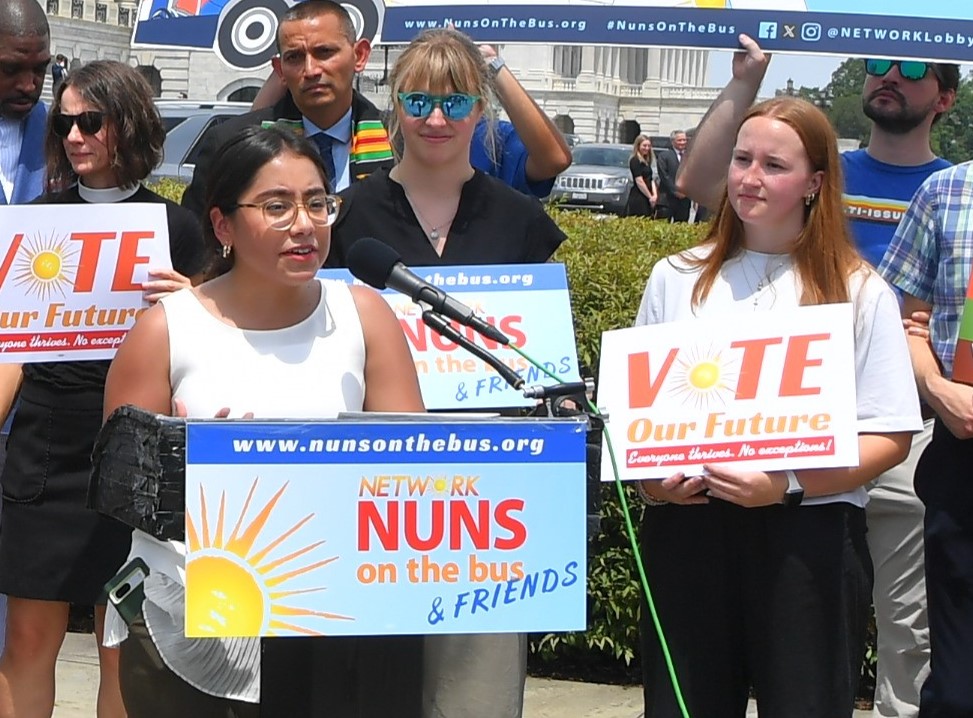Immigrant Families: What’s at Stake and How We Respond
Congress has allocated hundreds of billions of dollars to ramp up raids and detain thousands of our neighbors and loved ones at a massive taxpayer and moral cost
Giovana Oaxaca
August 5, 2025
The recently passed budget reconciliation bill diverts resources from communities to mass deportation efforts and border militarization. As Congress raises spending, it is also reinforcing state and federal cooperation. Most of these funds will be spent before September 30, 2029. In this first of a three-part series, Giovana Oaxaca, NETWORK Senior Government Relations Advocate for Immigration, will address immigration in the bill.
In cities across the country, ICE raids have become all too common, leaving families shattered and communities living in fear. But we don’t have to accept terror as the status quo. Immigrants, their families, neighbors, employers, and advocates are united in demanding respect for human dignity, protection of basic rights, and a government that serves the common good. NETWORK staff and advocates have been on the frontline of defending immigrant rights—turning the passage of recent legislation into a moral awakening.

Giovana Oaxaca, who now serves as NETWORK Senior Government Relations Advocate for Immigration, speaks at the 2024 Nuns on the Bus & Friends announcement. Photo: Larry French/AP Content Services for NETWORK Nuns on the Bus and Friends
To understand the most aggressive immigration crackdown in recent U.S. history, let’s unpack how the budget reconciliation will drive mass deportations that tear families apart; impose higher immigration fees on already burdened families; and cut health and food assistance, denying children and families the necessary resources they need to thrive.
Diverting Community Resources to Fund Mass Deportation Efforts
The rapid growth of the detention system is poised to continue. Congress provided $45 billion to expand adult and family immigration detention, enough to maintain 100,000 detention beds per day. The bill includes a $29.9 billion lump sum that can be used to hire 10,000 new ICE agents, upgrade facilities, detain families together, and expand the use of 287(g) agreements, among other uses. Another $5 billion for the Bureau of Prisons (BOP) could allow for continued repurposing of prisons for immigration detention.
- In the text of the bill, Congress failed to create guardrails to prevent the prolonged detention of children and their families, in potential contravention of the Flores Settlement Agreement. This puts the protection of children at even greater risk.
- On May 10, the Trump administration moved to terminate Flores, the landmark court order establishing the standards of treatment, care, and release of children in federal immigration custody.
Another significant amount of funding ($3.32 billion) is allocated to the Department of Justice (DOJ) for hiring immigration judges, combatting drug trafficking, investigating and prosecuting immigration matters, supporting state and localities’ immigration enforcement efforts through community policing grants, and compensating states and localities for jailing immigrants. Congress effectively guarantees that the deportation infrastructure will be primed to deport one million people annually, ramping up kidnappings, accelerating the removal process, and raising barriers to relief.
- According to the latest data from ICE, a record number of arrests were made in June, influenced by soaring daily arrest quotas. The arrests have increasingly included those without a criminal record, and it stands to reason that more will be arrested as “collateral” with agents instructed to “turn up the creative knob to 11 and push the envelope”.
- ICE surpassed the 41,500 detention beds funded by Congress, holding closer to 58,000 in custody as of June 29. Individuals are detained across a vast network of approximately 436 for-profit prisons, county jails, processing centers, and other facilities, including the family detention center at Dilley, Texas.
- Adults have been crammed into overcrowded rooms with no showers, inadequate food and water, and limited ways to contact their families to tell them where they are.
- Amid these deteriorating conditions, both detention watchdog agencies—the Office for Civil Rights and Civil Liberties (CRCL) and the Office of the Immigration Detention Ombudsman— were shuttered by the Trump administration.
Entrenching State-Federal Cooperation
New programs created by Congress cement further state and local law enforcement collaboration on immigration enforcement, eroding trust in local law enforcement.
The bill provides $3.5 billion for establishing a new grant program under the DOJ called the Bridging Immigration-related Deficits Experienced Nationwide (BIDEN) Reimbursement Fund, which states and localities can use for a range of purposes, including apprehending unlawfully present non-citizens who have committed crimes and for the criminal detention of non-citizens. State and local cooperation is emphasized with a further $2.055 billion lump sum created to fund hiring new Customs and Border Protection (CBP) agents, deportations, enhanced screenings of immigrants, and the deportation of unaccompanied children from contiguous countries. It will also reimburse states and localities for various immigration and security efforts, providing for the deportation of unaccompanied children, expedited removal of non-citizens who have committed crimes, and screening unaccompanied children for possible gang affiliations.
This spending allows deeper entanglement between state and local law enforcement and federal authorities. An additional $13.5 billion is allocated to states for border-related immigration enforcement, $10 billion for a “State Border Security Reinforcement Fund,” and $450 million for Operation Stonegarten, which bolsters state and local law enforcement at the border. This further embeds state and local law enforcement into both administrative and criminal enforcement of immigration laws, blurring lines.
This may contribute to the erosion of trust between local police and immigrant communities due to fear. In one survey, 35 percent of Latino parents said they planned to avoid talking to police or reporting crimes because of fear.
Ramping Up Deadly Border Enforcement
Under this legislation, $46.5 billion is provided for new and replacement border walls and barriers. Congress also makes $4.1 billion available to hire new Border Patrol agents, $2 billion to award bonuses, and $5 billion to make facility and checkpoint upgrades. Aside from the already provided amounts, $10 billion is provided to DHS for unspecified homeland security measures. Our tradition teaches that truth must precede reconciliation, and that repair is a spiritual discipline. As Pope Francis reminds us, “Every human being is precious.” That sacredness demands a public reckoning with the truth and a commitment to systemic transformation, so that all of us can thrive.
Part 2 of this series explores fairness for immigrant families.







